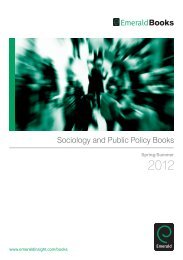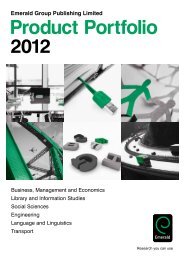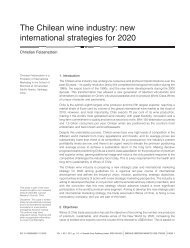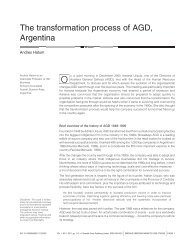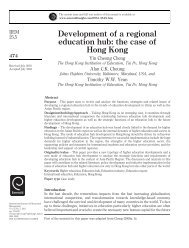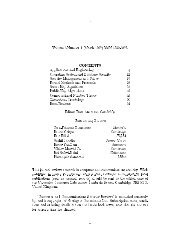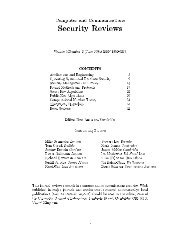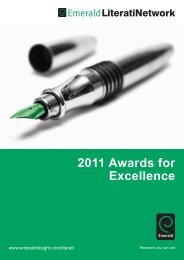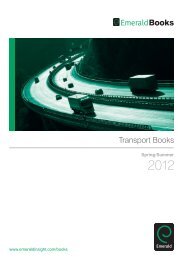Facilitating transdisciplinary sustainable development research ...
Facilitating transdisciplinary sustainable development research ...
Facilitating transdisciplinary sustainable development research ...
Create successful ePaper yourself
Turn your PDF publications into a flip-book with our unique Google optimized e-Paper software.
IJSHE<br />
11,1<br />
48<br />
McNeill, D. (1999), “On interdisciplinary <strong>research</strong>: with particular reference to the field of<br />
environment and <strong>development</strong>”, Higher Education Quarterly, Vol. 53, pp. 312-32.<br />
Mitra, A. (2001), “Marginal voices in cyberspace”, New Media and Society, Vol. 3 No. 1, pp. 29-48.<br />
Mitra, A. and Schwartz, R. (2001), “From cyberspace to cybernetic space: rethinking the<br />
relationship between real and virtual spaces”, Journal of Computer Mediated<br />
Communication, Vol. 7 No. 1, available at: http://jcmc.indiana.edu/vol7/issue1/mitra.html<br />
Mowbray, M. (2001), “Philosophically based limitations to freedom of speech in virtual<br />
communities”, Information Systems Frontiers, Vol. 3 No. 1, pp. 123-31.<br />
Peavey, F. (1994), By Life’s Grace: Musing on the Essence of Social Change, New Society, Gabriola<br />
Island.<br />
Pervan, G., Lewis, L. and Bajwa, D. (2004), “Adoption and use of electronic meeting systems in<br />
large Australian and New Zealand organizations”, Group Decision and Negotiation, Vol. 13,<br />
pp. 403-14.<br />
Pilking, T. and Walker, A. (2003), “<strong>Facilitating</strong> debate in networked learning: reflecting on on-line<br />
synchronous discussion in higher education”, Instructional Science, Vol. 31, pp. 41-63.<br />
Ramadier, T. (2004), “Transdisciplinarity and its challenges: the case of urban studies”, Futures,<br />
Vol. 36, pp. 423-39.<br />
Ridings, C., Gefen, D. and Arinze, B. (2002), “Some antecedents and effects of trust in virtual<br />
communities”, Journal of Strategic Information Systems, Vol. 11, pp. 271-95.<br />
Robinson, J. (2008), “Being undisciplined: transgressions and intersections in academia and<br />
beyond”, Futures, Vol. 40 No. 1, pp. 70-86.<br />
Rose, M. (2004), “Comparing productive on-line dialogue in two group styles: cooperative and<br />
collaborative”, American Journal of Distance Education, Vol. 18 No. 2, pp. 73-88.<br />
Russell, A.W., Wickson, F. and Carew, A. (2008), “Transdisciplinrity: context, contradictions and<br />
capacity”, Futures, Vol. 40, pp. 460-72.<br />
Stokols, D. (2006), “Towards a science of <strong>transdisciplinary</strong> action <strong>research</strong>”, American Journal of<br />
Community Psychology, Vol. 38, pp. 63-77.<br />
Thompson Klein, J. (2004), “Prospects for transdisciplinarity”, Futures, Vol. 36 No. 4, pp. 515-26.<br />
Wickson, F., Carew, A. and Russell, A. (2006), “Transdisciplinary <strong>research</strong>: characteristics,<br />
quandaries, and quality”, Futures, Vol. 38, pp. 1046-56.<br />
About the authors<br />
Ann Dale holds a Canada Research Chair in Sustainable Community Development at Royal<br />
Roads University and chairs the Canadian Consortium for Sustainable Development Research.<br />
Her <strong>research</strong> interests encompass <strong>sustainable</strong> community <strong>development</strong>, social capital and<br />
network formation and community agency.<br />
Lenore Newman is the Program Head of the Master’s of Environmental Management program<br />
at Royal Roads University and is the President of the Environmental Studies Association of<br />
Canada and her <strong>research</strong> interests include <strong>sustainable</strong> food systems, sustainability and urban<br />
form, and the environmental implications of virtual spaces. Lenore Newman is the corresponding<br />
author and can be contacted at: lenore.newman@royalroads.ca<br />
Chris Ling has a background in landscape planning and environmental studies and is<br />
interested in landscape multifunctionality, quality of life capital, urban fringe and post-industrial<br />
landscapes and sustainability.<br />
To purchase reprints of this article please e-mail: reprints@emeraldinsight.com<br />
Or visit our web site for further details: www.emeraldinsight.com/reprints



